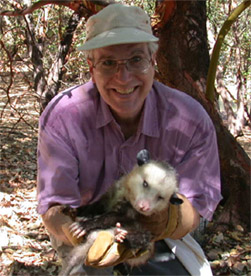|
|
|
|
|
 |
Jos. J. Schall Professor Emeritus of Biology University of Vermont e-mail Prof. Schall |
|
Jos. J. Schall joined the faculty of the University of Vermont in 1980, and retired to Emeritus status in June 2014. He received his BS from Penn State, the MS from the University of Rhode Island, and the Ph.D. from the University of Texas. His interests in graduate school were community ecology and geographic trends in species richness. He conducted field work in the diverse Cnemidophorus lizard asemblage in the desert of SW Texas. Some of this work was published with his mentor, Eric Pianka. Schall's interests then shifted to parasites, and he was awarded an NIH individual postdoc at the University of California, Berkeley, where he worked with noted parasitologist John Simmons.
Since 1978 he has conducted a long-term study of the malaria parasites of lizards (in both the lizard and insect vector) at a site in northern California (UC's Hopland Research and Extension Center field station), and several Caribbean sites, including a long-term study on the tiny islands of Saba and St. Martin and the LTER site at El Verde in Puerto Rico. A team of researches at the University of Puerto Rico is now continuing that project, using in part the data generated during those early years of study. A study in Sierra Leone, west Africa, while productive, had to end because of civil war. His current work centers on the biology of another apicomplexan parasite, Monocystis of earthworms. In a break from studies on parasites, he worked with graduate students Denise Dearing and Steve Ressel on diet selection by herbivorous lizards on small Caribbean islands and with graduate student Diane (Cannon) Faile on the nesting behavior of the Pelagic Cormorant.
Schall has been honored by the University of Vermont with the two highest awards for teaching excellence, and the university's highest award for research excellence. His research was continuously funded for more than 30 years by the NSF, and by the Morris Animal Foundation for studies on avian malaria parasites. His work has resulted in more than 90 publications in major scientific journals. Now "retired" from the UMV faculty, and the lab has closed, he continues his research from his home office... mining old and new data. |
|